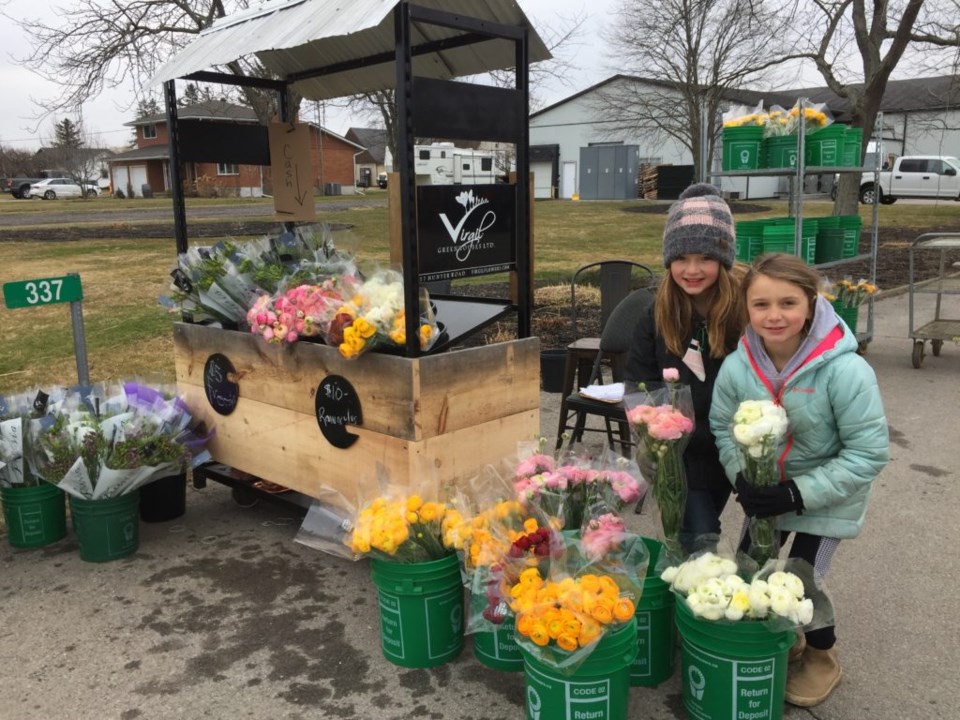
UPDATE: A statement from the Ontario Fruit and Vegetable Growers Association on the status of travel restrictions for foreign workers: Deputy Prime Minister Chrystia Freeland says there is a "conditional resumption of worker flow in the seasonal agriculture worker program and temporary foreign worker program." The announcement is dated Friday, March 20. The OFVGA says it is waiting for more details about the terms of the conditional resumption, including the protocol when the workers arrive.
"
Niagara-on-the-Lake is rich with family businesses growing flowers under glass.
But what was a thriving local industry until just days ago is threatened by COVID-19 on two levels. Like other farm operations, they were waiting and hoping that seasonal workers would be allowed into the country, to help them as they gear up to their peak season.
But unlike tender fruit, vegetable and grape farmers, orders of cut flowers have largely been cancelled.
Pim Boekestyn and his brother Tom started growing freesias all year round in Hunter Road greenhouses almost three decades ago. With the help of family and dedicated staff, Virgil Greenhouses took over the market and became the largest producer of cut freesias in North America.
Tom has since retired, and Pim has brought his son Peter and his son-in-law Tim Moes onboard.
Their cooler is now full of thousands of cut freesias and ranunculus, both popular in bouquets, ready to go to market. And more will be cut every day, as they gear up for their peak season — Easter, followed by Mother’s Day.
But at the moment, Moes says, their orders have almost all been cancelled.
The Boekestyn family business operates about four acres under glass, and at this time, the greenhouses are almost full.
A truck of their cut flowers went to the Ontario Flower Growers cooperative auction in Toronto on Tuesday, and about half of the load was sold, but by Thursday it was a different story. “We didn’t sell much at all, and prices were below half of what they should be,” he said. “When Toronto can’t move your product, you know you’ve met your new reality.”
The wholesalers they’ve been dealing with have put a freeze on orders — so much about the future is unknown, says Moes.
“We had an order this week from Sobeys for 75 bunches. We need to move 5,000 bunches, not 75.”
There were 3,000 bunches of cut flowers in the cooler today, ready to be sold, and there will be 4,000 tomorrow and 5,000 next day, he says.
They’ve been dropping boxes of cut flowers at lower income housing and long-term care homes, just leaving them outside, and other greenhouses are doing the same.
Their sales now are limited to the roadside stand they have set up, and after posting a photo on Instagram, Moes says he’s been “blown away” by the response. “We didn’t expect we’d get this kind of support. It’s been non-stop since Tuesday.”
As overwhelmed as they’ve been by the positive reaction from the community, they can’t expect it to keep up in the coming days and weeks, which is what they would need to make a dint in what they’ll have ready for sale.
“We’re still cutting,” he says, but cut flowers are perishable, and last three to four days maximum. After that, they go bad, and have to be thrown out.
Seasonal workers were expected to arrive last week, and if, as it seems by the most recent announcement, they are allowed into the country but the current situation continues, “we won’t need them," says Moes.